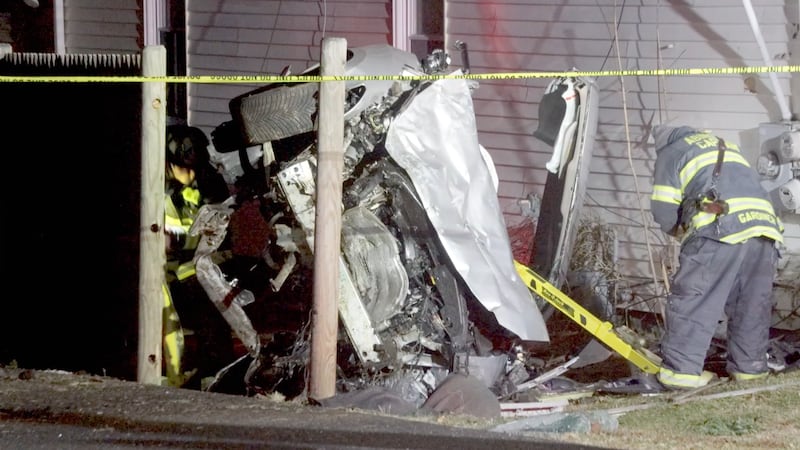BOSTON — Amid a national crisis surrounding vaping products, the City of Boston is issuing changes to the existing regulations on the sale of tobacco and nicotine products.
Health officials and lawmakers have been working around the clock to study what could be behind the vaping-related lung illnesses that have made headlines recently and also to ensure the safety of the public.
So far, seven people have died due to vaping-related illnesses connected to the use of e-cigarettes, or the battery-powered devices being marketed as alternatives to cigarettes that mimic smoking by heating liquids that contain nicotine.
While e-cigarettes have garnered the media's attention recently, they are not a new product on the shelves. E-cigarettes have been sold for over a decade, but only now have reports of vaping-related illnesses started to pop up, primarily among younger users.
The Boston Public Health Commission votes to move ahead in a first step to ban vaping flavors of menthol and mint. Story at 6 on #Boston25 pic.twitter.com/27HkHQ4HFb
— John Monahan (@JohnMonahanTV) September 18, 2019
On Wednesday evening, Boston Mayor Marty Walsh announced the Boston Public Health Commission is proposing new regulations aimed at curbing vaping and tobacco use among teenagers and young adults.
Under the BPHC's new proposal, mint and menthol nicotine and tobacco products will only be sold in verified adult-only tobacco retailers, which means you probably won't be able to find any mint-flavored Juul pods at your local 7/11.
"Teen vaping is an epidemic that is particularly alarming because we know that nicotine use at a young age can have the power to lead to a lifelong dependency," said Mayor Walsh. "The data is undeniable in showing that these amendments would save lives. I believe that now is the time to act, and I thank our public health staff for bringing forward a proposal that will ensure Boston has some of the strongest regulations in the country to protect our young people."
Boston is one of the leading cities in the country fighting what experts are calling a vaping epidemic, taking steps to restrict youth consumption of nicotine and tobacco products and other nicotine products such as e-cigarettes, vapes and "e-juices."
Four years ago, the city voted to regulate "fruity" e-cigarette flavors, but now in a more aggressive move, the city is going after mint and menthol flavors.In 2015, the city also voted to increase the age to purchase tobacco and nicotine products to 21.
"On behalf of the Board of Health, I am excited that we are moving to address both the long-standing issue of menthol tobacco use as well as the rapidly-emerging issue of youth nicotine use and vaping," said Manny Lopes, chairman of the Board of Health and chief executive officer of East Boston Neighborhood Health Center (EBNHC). "I applaud Mayor Walsh’s leadership on this pressing public health issue and look forward to engaging with the community during the public comment period."
Due to the fact that most e-cigarettes and vape juices contain nicotine, health officials warn of the high potential for addiction, especially among the youth.
According to the Center for Disease Control and Prevention, vaping products can also cause long-term harm to brain development and respiratory health. The CDC says that, among high school students, the use of flavored e-cigarettes in 2018 was up by 67% and the current use of menthol- or mint-flavored e-cigarettes was over 51%.
The BPHC's proposed regulatory amendments are also looking to address issues related to long-standing disparities in tobacco use patterns and deaths stemming from diseases such as heart disease, cancer and stroke.
In Boston, researchers found that, among adults, black men and women suffer from tobacco-related mortality more than any other ethnic or racial group.
The proposal will also strengthen requirements for retailers checking IDs and restricting the sale of products that attract young people.
Backed by the BPHC, Boston Public Schools has been working on launching a district-wide public awareness campaign focused on youth smoking and vaping prevention, professional development training for teachers and staff, a comprehensive health education curriculum and referrals to smoking cessation programs.
"Regulatory changes made over the last decade, combined with efforts to build strong partnerships with schools, health centers and other community organizations, have played important roles in reducing smoking among Boston residents," said Boston Public Health Commission Executive Director Monica Valdes Lupi. "The marketing and retail practices of tobacco companies that have been used for decades to infiltrate our communities of color with menthol tobacco products are unacceptable, and the fact that similar tactics are being used now to target our kids with vaping products demands action."
Officials will now move forward with an engagement process that will include a public comment period and public hearing before a Board of Health vote to approve the amendments.
The public hearing is set for Nov. 7 and a public comment period will run until Nov. 8. Written comments can be submitted by email to boardofhealth@bphc.org.
>> MORE ON VAPING FROM BOSTON 25 NEWS:
Cox Media Group





